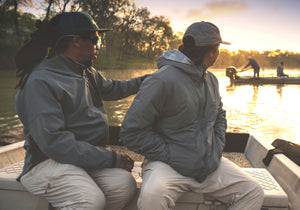Fly fishing is more than just a hobby—it’s a lifestyle that connects anglers with nature, fosters patience, and rewards persistence. For experienced anglers, sharing this passion with beginners is not just about teaching fly fishing techniques; it’s about passing on a love for the craft and helping newcomers feel welcomed into the community. But how can seasoned anglers best mentor those just starting their journey?
Why Mentoring Matters in Fly Fishing
Mentoring beginners is a vital part of preserving the traditions and joys of fly fishing. For a novice, the world of fly fishing can feel overwhelming: from choosing the right gear to mastering the cast. A patient mentor can make all the difference, providing guidance, encouragement, and inspiration.
By teaching fly fishing to newcomers, you not only enhance their experience but also help sustain this timeless sport. Mentoring fosters camaraderie and ensures the values of respect for nature and ethical angling are passed onto future generations.
The Role of a Mentor in Fly Fishing
As a mentor, your role goes beyond instruction. You’re a guide, cheerleader, and often a fellow learner. Here are some ways experienced anglers can help beginners learn and enjoy fly fishing:
- Building Confidence: Encourage incremental progress and celebrate small wins, like a well-tied knot or a decent cast.
- Providing Perspective: Emphasize the enjoyment of the journey over the outcome. Catching a fish is thrilling, but so is spending a day on the water.
- Sharing Wisdom: Offer insights into local waters, fish behavior, and effective flies—knowledge that only comes with experience.
- Being Patient: Remember that every expert was once a beginner. Approach mistakes as opportunities for learning.
Getting Started: Tips for Teaching Fly Fishing to Beginners
Choosing the Right Gear Together
The first step in mentoring a beginner is helping them choose the right equipment. For someone new to fly fishing, the variety of rods, reels, and flies can be daunting. Guide them towards versatile, beginner-friendly options.
- Start Simple: Recommend a rod and reel combo designed for beginners. Orvis offers excellent starter kits that balance affordability with quality.
- Explain the Essentials: Teach them about the basic components of a fly fishing setup—line, leader, and tippet—and their functions.
- Pick a Few Flies: Instead of overwhelming them with choices, suggest a handful of versatile flies suited to local waters.
Teaching Basic Casting Techniques
Casting is fundamental to fly fishing, and it’s often the first skill beginners want to learn. Keep your instruction simple and hands-on:
- Demonstrate First: Show them a basic overhead cast and explain each step as you go.
- Use Analogies: Relate the motion to something familiar, like flicking paint off a brush, to make it relatable.
- Practice on Land: Before hitting the water, have them practice in an open field to build muscle memory.
- Give Constructive Feedback: Focus on what they’re doing right and gently correct mistakes.
Introducing Beginners to the Water
Once they’re comfortable casting, it’s time to introduce them to the water. Choose a location that’s beginner-friendly—a spot with easy access, minimal obstructions, and a healthy fish population.
- Safety First: Teach them about wading safety, including the importance of polarized sunglasses to see underwater hazards.
- Set Realistic Goals: Start with easier-to-catch species like trout or panfish to build confidence.
- Help Them Observe: Show them how to read the water, spot fish, and understand insect activity.
Cultivating Patience and Appreciation
Fly fishing teaches patience, and this is a lesson that’s best learned early. As a mentor, you can model this mindset:
- Embrace Slow Days: Explain that slow fishing days are part of the experience and offer time to refine skills or simply enjoy nature.
- Celebrate Progress: Highlight improvements, even if they’re not catching fish right away.
- Share Stories: Talk about your own early struggles and triumphs to inspire them to keep going.
Building a Foundation of Conservation
One of the greatest gifts you can give a beginner is a deep respect for the environment. Fly fishing is inherently tied to the health of rivers, lakes, and ecosystems.
- Teach Leave No Trace Principles: Show them how to minimize their impact on the environment by picking up litter and treading lightly.
- Discuss Ethical Angling: Emphasize the importance of catch-and-release practices and handling fish responsibly.
- Encourage Stewardship: Inspire them to protect local waters by getting involved in conservation projects.
Staying Connected and Encouraged
Mentoring doesn’t end after the first outing. Staying in touch and continuing to offer support can turn a beginner into a lifelong angler.
- Invite Them Back: Plan regular fishing trips together to reinforce their skills and deepen your connection.
- Recommend Resources: Suggest books, videos, or classes that align with their interests.
- Celebrate Milestones: Whether it’s their first catch or mastering a new technique, make a big deal of their accomplishments.
Final Thoughts: Sharing the Fly Fishing Lifestyle
Mentoring a beginner is a rewarding way to give back to the fly fishing community. By teaching fly fishing with patience, enthusiasm, and respect, you help new anglers discover a passion that can last a lifetime. Remember, it’s not just about casting lines—it’s about sharing experiences, building relationships, and passing on the values that make fly fishing so special.
So, the next time someone expresses interest in fly fishing, seize the opportunity to be their guide. Together, you’ll not only improve their skills but also strengthen the bonds that make this sport so extraordinary.

